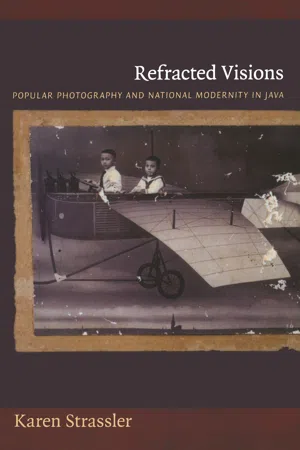
Objects/Histories
Popular Photography and National Modernity in Java
- English
- PDF
- Available on iOS & Android
About This Book
A young couple poses before a painted backdrop depicting a modern building set in a volcanic landscape; a college student grabs his camera as he heads to a political demonstration; a man poses stiffly for his identity photograph; amateur photographers look for picturesque images in a rural village; an old woman leafs through a family album. In Refracted Visions, Karen Strassler argues that popular photographic practices such as these have played a crucial role in the making of modern national subjects in postcolonial Java. Contending that photographic genres cultivate distinctive ways of seeing and positioning oneself and others within the affective, ideological, and temporal location of Indonesia, she examines genres ranging from state identification photos to pictures documenting family rituals.
Oriented to projects of selfhood, memory, and social affiliation, popular photographs recast national iconographies in an intimate register. They convey the longings of Indonesian national modernity: nostalgia for rural idylls and "tradition, " desires for the trappings of modernity and affluence, dreams of historical agency, and hopes for political authenticity. Yet photography also brings people into contact with ideas and images that transcend and at times undermine a strictly national frame. Photography's primary practitioners in the postcolonial era have been Chinese Indonesians. Acting as cultural brokers who translate global and colonial imageries into national idioms, these members of a transnational minority have helped shape the visual contours of Indonesian belonging even as their own place within the nation remains tenuous. Refracted Visions illuminates the ways that everyday photographic practices generate visual habits that in turn give rise to political subjects and communities.
Frequently asked questions
Information
Table of contents
- Contents
- Illustrations
- Preface
- Acknowledgments
- Note on Orthography and Pseudonyms
- Introduction: Popular Photography and Indonesian National Modernity
- One: Amateur Visions
- Two: Landscapes of the Imagination
- Three: Identifying Citizens
- Four: Family Documentation
- Five: Witnessing History
- Six: Revelatory Signs
- Epilogue: Beyond the Paper Trace
- Notes
- Bibliography
- Index